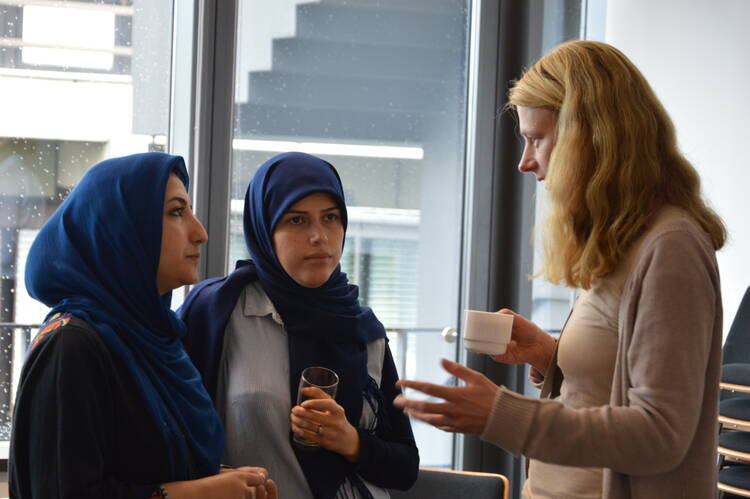Cambridge, MA. A few days ago, I was in Paderborn, Germany, for a conference on comparative theology, its methods and purposes. (“Comparative theology:” faith seeking understanding even across religious borders, learning from other traditions so as better to understand our own and thus to deepen our understanding of our faith and theirs.)
Paderborn, a small city in the middle of the country, in North Rhine-Westphalia, is a very old center of Christianity. It was there that Pope Leo III, in flight from his enemies, met with Charlemagne in 799. By agreement, Charlemagne accompanied the Pope to Rome and restored him to authority, and in 800, the Pope crowned Charlemagne the first Holy Roman Emperor. Paderborn is a birthplace of Christendom, indeed.
The conference brought together about 30 professors and doctoral students from the University of Paderborn (and from the UK and Amsterdam) and a number of USA institutions, including Boston College, Georgetown, Loyola Chicago, Wake Forest and, of course, Harvard University. For three full days we discussed the practices and methods of comparative theology, in papers that crossed the boundaries between the Christian and the Hindu or Buddhist, the Christian and the Jewish or Muslim. You can find the paper titles here, though unfortunately, you cannot see the actual papers without the password (since these are drafts, not ready for publication). It was great to meet scholars interested in the same comparative learning, and particularly to hear from the younger scholars, finishing their studies or in their first teaching positions, both taking up the work of interreligious learning and bringing to it the concerns and questions of their own generation. More such conferences will surely follow.
Impressive, beyond the fact of this small conference, is the intense and long-term collaborative work being done all the time at theCentre for Comparative Theology and Cultural Studiesat the University of Paderborn. The Centre fulfills the vision of its founder, Professor Klaus von Stosch, in bringing together committed scholars of Catholic and Protestant traditions and distinguished Muslim scholars — all committed to comparative study and learning from one another. Their conversations and study do not stay on the level of superficial comparisons, but get into subtler and deeper issues where Christians and Muslims can learn from one another, and at long last ask deeper and sometimes more difficult questions. The Centre has published an impressive series of books that cover a great number of topics (such as Trinity, Christology, prophecy, and salvation) Sorry, the books are all auf Deutsch!
The Centre is extraordinary in the opportunities it creates for Muslim students (German, and from Iran, Lebanon, and other countries) and Catholic students (mainly German) to study together, learning each other’s traditions, and thinking through theological themes important to both traditions. Anyone getting a PhD through this Centre will be well-versed in bothreligions, able to draw on the best of both, and to cast aside stereotypes regarding bothof them: learning that dispels the darkness.
The Centre obviously speaks to an urgent concern in today’s world — Christian-Muslim understanding rather than violence — and to the changing situation in Europe and particularly German today, which is becoming a new kind of multi-religious society. Too often the headlines blare out only the religious misunderstandings, tensions, and social unrest, as if Christians and Muslims can only misunderstand one another. Deeper, quieter, and in the long run more important in the long run are initiatives like this Centre and the deep roots it digs for understanding and shared theological vision. This too is the crucial work of the Church. No one centre or program can do the needful on its own, and so our conference too — bringing together energies from both sides of the ocean — was also an important step forward.
Christendom is over, even in Charlemagne’s Paderborn. Now it is a Christian — and Muslim and Hindu and Jewish — vision and practice of interreligious learning that will be Paderborn’s — and our own — future.







